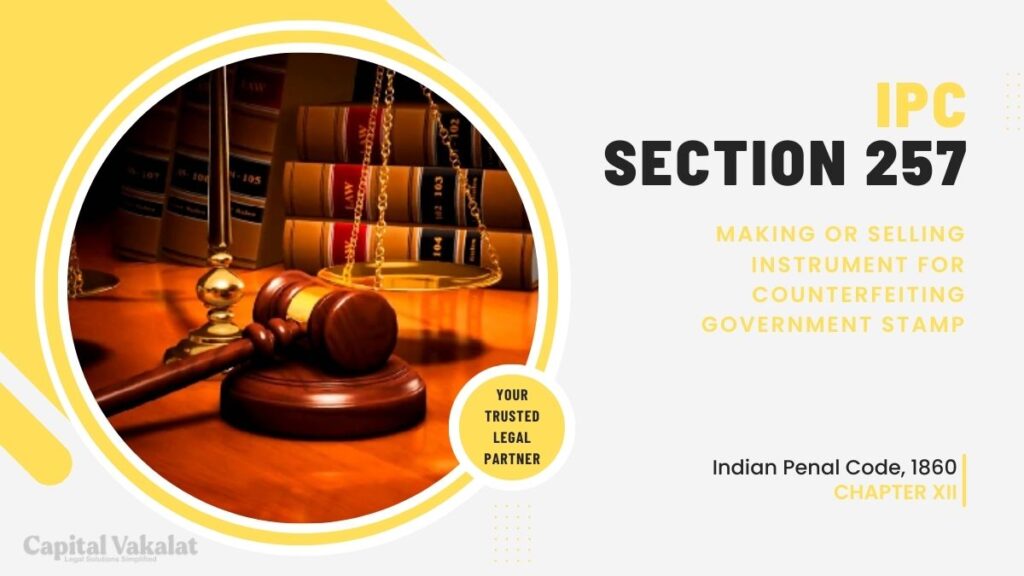In this comprehensive article, we will delve into the intricacies of Section 257 of the Indian Penal Code (IPC), which pertains to the making or selling of instruments for counterfeiting government stamps.

This legal provision plays a vital role in safeguarding the integrity of government documents and financial transactions, making it essential for individuals and businesses to understand its implications.
Introduction to Section 257 IPC
Section 257 IPC, a part of the Indian Penal Code, is aimed at preventing the counterfeiting of government stamps and the fraudulent use of such counterfeit stamps. Government stamps are essential for various official documents, and counterfeiting them poses a significant threat to the nation’s financial and administrative systems.
Understanding Counterfeiting of Government Stamps
Counterfeiting government stamps involves the creation or use of fake stamps that resemble genuine government-issued stamps. Such counterfeiting is often done with the intention of evading legal obligations, such as taxes or fees. Counterfeiters typically aim to deceive authorities and gain unlawful benefits.
Offenses Covered by Section 257 IPC
Section 257 IPC specifically addresses two primary offenses:
- Making Instruments for Counterfeiting: Any individual who creates instruments or tools with the intention of counterfeiting government stamps is in violation of this section. This includes designing or printing equipment used for producing counterfeit stamps.
- Selling Instruments for Counterfeiting: Section 257 also covers the act of selling or distributing instruments intended for counterfeiting government stamps. This not only includes the sale of counterfeit stamps but also the tools used to create them.
Punishments and Penalties
The penalties under Section 257 IPC are severe to deter potential offenders:
- Individuals found guilty of making or selling instruments for counterfeiting government stamps can face imprisonment of up to seven years.
- If the offense is committed with knowledge that the counterfeit stamps will be used for fraudulent purposes, the punishment may extend to life imprisonment.
- Additionally, individuals may also be liable to pay fines as determined by the court.
Significance of Government Stamps
Government stamps serve as legal indicators for various documents, such as property deeds, court documents, and financial agreements. They act as proof of payment of necessary duties and taxes. Counterfeiting these stamps can lead to financial losses for the government and hinder the legal and administrative processes.
Legal Implications for Counterfeiters
Counterfeiters found guilty under Section 257 IPC may face not only criminal charges but also civil liabilities. They may be required to compensate the government for the financial losses incurred due to their actions. Moreover, having a criminal record can severely impact their future prospects, including employment opportunities and financial stability.
The Role of Law Enforcement Agencies
Ensuring the enforcement of Section 257 IPC falls under the purview of law enforcement agencies. Specialized units often work in collaboration with the Department of Revenue and the Central Board of Indirect Taxes and Customs to detect and prosecute cases of government stamp counterfeiting.
Challenges in Detecting Counterfeiting
Detecting counterfeit government stamps is a complex task due to the evolving sophistication of counterfeiters. The use of advanced printing technology and design techniques makes it increasingly difficult to distinguish fake stamps from genuine ones. As a result, law enforcement agencies must continuously adapt to counter these challenges.
Preventive Measures and Security Features
To combat counterfeiting, the government has introduced several security features in its stamps. These include holograms, watermarks, UV ink, and intricate designs that are difficult to replicate. Businesses and individuals should always verify the authenticity of government stamps on documents to prevent inadvertently engaging with counterfeit materials.
Conclusion
Section 257 IPC serves as a crucial legal provision to combat the counterfeiting of government stamps. By understanding its implications and supporting law enforcement efforts, individuals and businesses can contribute to the preservation of the integrity of government documents and financial transactions.
Frequently Asked Questions
How can I verify the authenticity of a government stamp on a document?
You can verify the authenticity of a government stamp by examining its security features, such as holograms, watermarks, and UV ink. Additionally, checking with the issuing authority can help confirm its validity.
What is the penalty for counterfeiting government stamps under Section 257 IPC?
The penalty for counterfeiting government stamps under Section 257 IPC includes imprisonment of up to seven years, which can extend to life imprisonment if fraudulent intent is proven.
Why is counterfeiting government stamps considered a serious offense?
Counterfeiting government stamps is a serious offense because it can lead to financial losses for the government and hinder the proper functioning of legal and administrative processes.
What is the government doing to prevent counterfeiting of stamps?
The government has introduced various security features in its stamps, making them harder to counterfeit. They also work closely with law enforcement agencies to detect and prosecute counterfeiters.